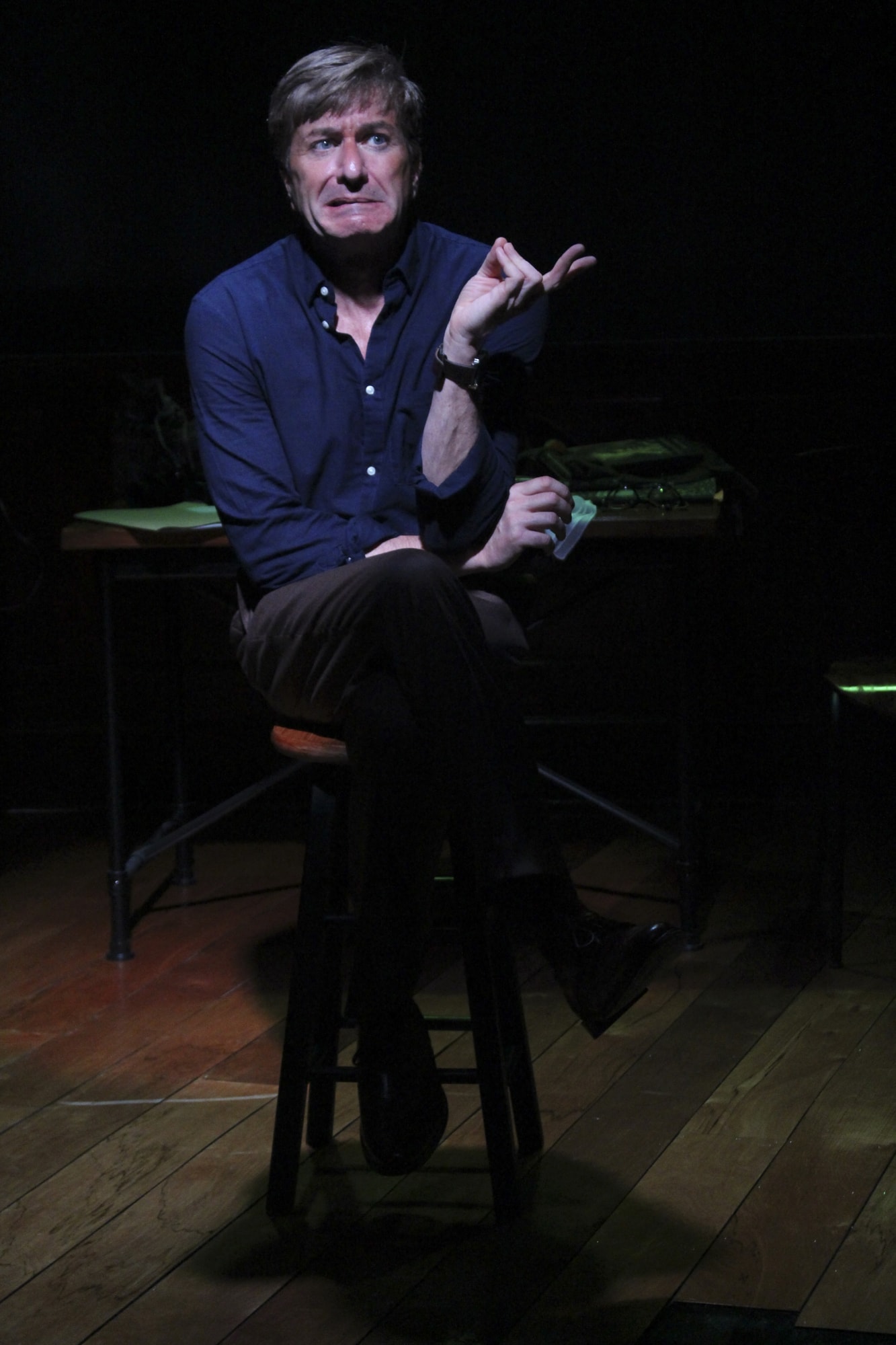“The dark side is my beat.” These are some of the first words heard from a New Jersey detective in The Absolute Brightness of Leonard Pelkey. He is recalling a hate crime from a decade previously that put his small “half-assed” South Jersey shore town, somewhere off the Garden State Parkway, on the map. It was a hate crime centered upon a missing young teen boy–a hate crime the detective ultimately closed with the help of some local citizens.

Settling in at 1st Stage as the opening production of this year’s Logan Festival of Solo Performances, The Absolute Brightness of Leonard Pelkey is no vapid, run-of-the-mill police procedural. Rather, Absolute Brightness has a unique aura about it, with its own wrinkles taking on the issue of violence against one determined young man named Leonard Pelkey. Leonard is considered “different” by many in his community. He pays a high price for not seeming to be like the other boys his age.
Absolute Brightness was written with heart-tugging decency by James Lecesne, directed with a sure hand by Kate Alexander, and effortlessly performed by Jeffrey Plunkett.
Solo actor Plunkett portrays about a dozen roles; male and female, old and young. Merely by spinning around or placing his masculine frame in just the right way or having his arms and fingers just so, with a high-pitched soprano voice, he becomes more than a ballsy, rather impatient Jersey detective named Chuck DeSantis. Over the course of the show’s intermission-free 80 minutes, Plunkett takes on several distinctive roles of women, including a local beauty salon owner named Ellen; then in a blink, he becomes Ellen’s often sullen older teen daughter Phoebe. Beyond Ellen and Phoebe, Plunkett becomes a British-accented afterschool drama teacher, a very hostile teen boy, an elderly watchmaker and a bevy of others. Some characterizations are comic and others deadly serious.
Much is learned about Leonard through the detective’s “interviews” with the townsfolk. Each provides little clues about Leonard and why he may be missing. Phoebe tells the detective that Leonard is gay. Ellen quickly corrects her daughter, telling the detective that Leonard was just “different…not like other boys.” Ellen also tells the detective that Leonard was good at in the beauty salon by providing beauty tips to customers about nail colors or new hairdos. To his British-born afterschool drama teachers, Leonard had suggested he “must have wings” to play Ariel, the fairy character in the Bard’s The Tempest. The detective also learned that Leonard cut up lots of colorful flip-flops to make platform rainbow sneakers. As the detective noted , Leonard just wanted to be himself.
Over time, clues provided by the local citizens mount up to give the detective a picture of who did what to Leonard. Small clues such as how rope knots are tied, or finding a money clip and a pocket watch add up until the disappearance is solved. But Absolute Brightness is far from over.
Not only is a crime solved, but detective DeSantis is no longer a gruff, blue-collar guy. He has become something else, even quoting The Bard, as he describes the case a decade before. He has a new-found happy demeanor about him. He has even left the police force for another line of work.
The Absolute Brightness of Leonard Pelkey has a sweetness to its final curtain. It is a production without irony, but full of humanity. Even its set design by Stephen Dunham adds to its quiet power with its nondescript furnishings, except for some projections. The set allows the script and the performance to take center stage.
There is a spiritual quality to The Absolute Brightness of Leonard Pelkey as the final blackout begins. It is a production of whispers, not shouts. Lecesne’s script is one of warm-hearted decency, making its points gently, not abrasively. Ultimately, Absolute Brightness is a softly-toned, empathetic show, with goodness and positive acts trumping earthly suffering.
The Absolute Brightness of Leonard Pelkey is a rewarding, affirmational tale about the difference one young boy makes in the lives of a small town. Its end message is clear and far from gloomy. It aims and succeeds at tugging into the audience’s collective heart. For some, like me, the ending may have been tied up too easily into a beautiful bow; but that is me. Please see it for yourself and decide.
Running Time: 80 minutes, with no intermission.
The Absolute Brightness of Leonard Pelkey plays through July 22, 2018, as part of the 2nd annual Logan Festival of Solo Performances at 1st Stage – 524 Spring Hill Road, in Tysons, VA. For tickets, call the box office at (703) 854-1856, or purchase them online.




